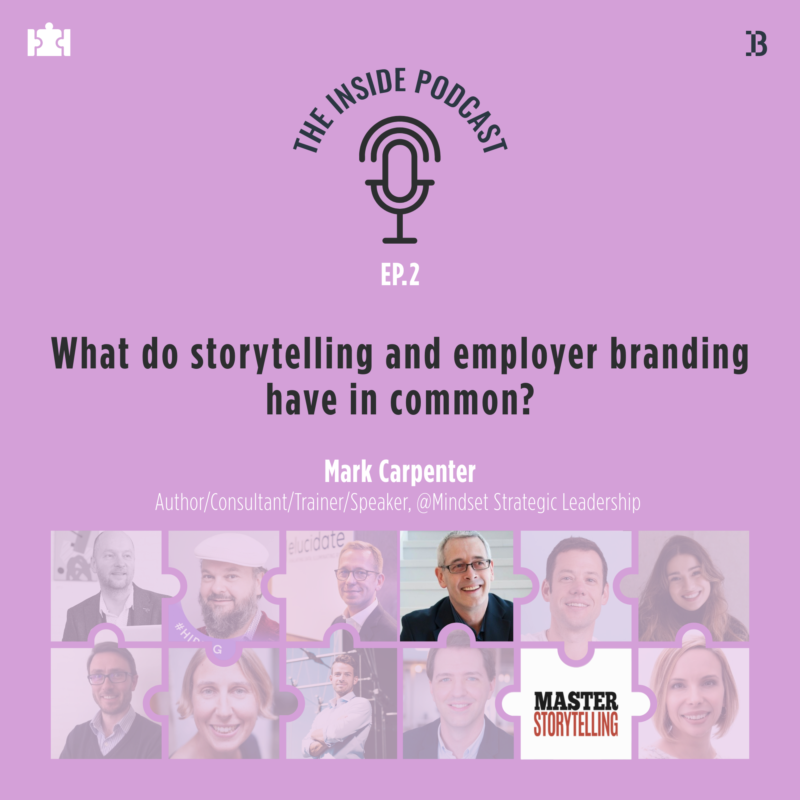Overview
In the 2nd episode of our 5th season, we spoke with Mark Carpenter, author of the book Master Storytelling, owner, trainer, and speaker at Mindset Strategic Leadership. Throughout the podcast, we talked about the impact stories have on every aspect of our lives, including the business realm, but also about how to leverage storytelling to add value to your business model.
According to Mark, “the best stories are the ones that create an emotional reaction”, and we couldn’t agree more.
What you’ll learn by listening
- The power of storytelling in employer branding & beyond
- Using stories to teach, lead, sell and inspire
- The impact of storytelling on your business model
- Storytelling – a skill that can be developed & nurtured in business
- Where to find stories that add value to your business?
- How the best stories are the ones that create an emotional reaction
- Tips & tricks for improving your skill at telling a story
About Mark
Following three career paths in public relations, marketing & communications, and high tech & software, Mark’s passion is to help others achieve more of their potential. “I use my three decades of experience (hey, that grey hair doesn’t come from a bottle) to provide perspective and guidance to others. I love coaching, consulting, and training in communications, leadership development, motivation, change management, and marketing/public relations. My style is collaborative and inquisitive, helping individuals, leaders, and teams see for themselves how they can achieve more and be more.”
Podcast link – Enjoy listening to The Inside Podcast, S05Ep.2!
Podcast transcription
Georgiana: Hi everyone! This is Georgiana with a new episode of Employer Branding: The Inside Podcast. Today we’re tackling a topic that’s, I would say, initially Employer Branding related, but I would say in the end, it’s related to every aspect of our everyday life. And that is storytelling. And I’m super excited to be talking to Mark Carpenter today. Mark is a myriad of things. He’s an author, consultant, and trainer. He’s a speaker at Mindset Strategic Leadership. But above all, he is a storytelling expert. And I’m super keen on hearing what he has to say with regards to integrating storytelling in our everyday lives and in our business profession as well. Mark, welcome to this podcast! Thank you so much for accepting to talk to me.
Mark Carpenter: Thank you, Georgiana. It’s my privilege and pleasure to be here.
Georgiana: Awesome. So Mark, why did you choose in the end storytelling as a career? You say, on LinkedIn, that you’ve switched between three careers. Why settle for this one?
Mark Carpenter: You know, it’s interesting, it kind of chose me. My first careers were in public relations and marketing communications with a bank for 10 years, and high tech and software for 10 years. And I got into facilitating and training and teaching. And storytelling became a very natural part of that. I actually helped a friend, co-author a book about six years ago.
And then I was thinking, I need to write my book. What’s my book? And I was talking to my wife about it, and she said, Oh, you need to write a book about how stories, how you can turn everyday experiences into stories that teach important principles. If my first reaction to that was yes, that’s not a book. And I started asking other people about it, and they got really excited about it too. And I thought, well, maybe there’s something there. So in a way, it was something that I’d done fairly naturally. But then I got into the details around the research of the book and found out that it’s very scientific, as well as artistic in terms of using stories to teach, lead, sell and inspire.
Georgiana: You know, I actually also started reading your book about two, three days ago. And I’m finding a lot of examples that are super, super useful for my career. And I will actually if times time allows it, I will read one of the ones that were the most inspiring to me from your book. However, what I really also really enjoyed was this homo fictitious idea, according to which man is essentially a creature that lives through and for telling stories. And I have to say that the first time, I read about this term, another book came to my mind, which is called the “Storytelling Animal”, which I read many, many years ago when I started with content marketing. But then I am really curious, is this your idea? Homo-fictitious? This is someone else’s idea?
Mark Carpenter: Yeah, that term is is actually someone else’s idea. But we, as people, we love stories, because we live stories. Our lives really are just a collection of the experiences and the stories that we have. And so it’s very natural for us to connect through story. We started speaking to each other much longer before we started writing. And so, this idea of storytelling is really very naturally built into us as human beings.
Georgiana: Mark, I have worked in marketing for quite a while now, it’s going to be 10 years, maybe 11, very soon. So I’ve learned through my area of activity, how important storytelling is in the economy of a brand. You know, every good product has a solid story behind it. Every successful founder is going to pitch you a very emotional story and is going to share a very emotional background that brought them there. But I’m still finding out that it’s super underestimated. Storytelling is still very understated in business. Why do you think that happens?
Mark Carpenter: Yeah. And I think it’s because we’ve somehow gotten into the habit of thinking storytelling is light. It’s too fluffy. And so we spend a lot of time working on statistics and data and information and features and benefits and lists of things. And we didn’t realize that we were losing connection with people as we do that. And certainly, those things are important. It’s important to have data, it’s important to have features and benefits. But at the same time, if we can tell the story of what those mean to people, that’s what’s really connecting. That’s what connects us as individuals, and people want to work with people that they can connect to, they feel connected to, in particular, you know, in terms of branding a company or branding yourself as you’re trying to join a company. It’s the stories that you tell that will really connect you to other people, or you feel like you want to work with each other.
Georgiana: I totally agree. But how is storytelling like a lollipop for your brand?
Mark Carpenter: Yeah, that’s, that’s a phrase we use. Because just think about it, it could be a lollipop, it could be anything. I had dinner with my two sisters last night, we went out afterward and had some ice cream. Just think about how satisfying that lollipop or that ice cream is. Well, part of it’s because of a physiological reaction that happens within you. Well, stories are the same way.
There is a physiological reaction that we get when we hear a good story. I agree. And that’s what connects us. In fact, there’s research done by Dr. Paul Zak at Claremont Graduate University, where he has identified three chemical reactions that we get when we hear stories. The first one is oxytocin. And we can relate to the characters and the stories, we can relate to that person who’s telling us their experience, and we get an increase of oxytocin, which actually increases our trust with the other person.
And then when we hear some level of conflict or risk that comes up in a story, we will get an increase in cortisol, which heightens our attention and makes us really want to know what’s going to happen because we’ve already cared about the other person with the increase in oxytocin. We care about what’s going to happen to them. So we want to know what’s next. And then when that story comes to a satisfying resolution, we get an increase in the neurotransmitter dopamine. And that’s really where it becomes like a lollipop to the brain. Because dopamine gives us a feeling of satisfaction, a sense of completeness. We get a little sense of dopamine, every time we check something off our to-do list, or when we’ve leveled up on a video game. And when those things happen, we get that kind of satisfying feeling. Yes, that’s what happens when you hear a good story.
Georgiana: Indeed, indeed. And you know what, I work a lot with professionals in the IT industry here in Berlin, and I’m still connected to Romania, where I come from. And I’ve discovered that it would be so much easier for companies to recruit better, to recruit more effectively if they made use of storytelling. But they have such a hard time leveraging it and using it to its full potential. Why do you think this happens?
Mark Carpenter: I think part of it is what I mentioned earlier, we don’t think about it. Or we discount our own experiences as good stories to teach, lead, sell and inspire. Sometimes we think, Oh, that’s just something that happened to me, it’s not that important. But really, it’s in those everyday ordinary experiences that the extraordinary comes out.
People want to hear things they can relate to. And I totally agree with what you’re saying Georgiana, that we miss an opportunity, when we’re trying to recruit and promote our company if we can tell the story of what it looks like, instead of just giving a list of here’s your job descriptions. If you can tell someone here’s an example of what a day looks like, for the person with this job, and tell some of the ups and downs of the challenges that they face. But some of the great things that we’re able to accomplish in that position. That’s inspiring to people, that’s going to make people want to come work for you more. By the same token, if I’m trying to get a job with your company, is when you asked me, How would you handle this type of situation if I can share with you a story of an experience where I actually handled one of those types of situations, that makes me more memorable? And that’s going to, again, connect me to you. So you will remember me more and likely hire me because we’ve made that connection.
Georgiana: Indeed, it’s maybe hard to measure its impact on the business and perhaps this is why people are reluctant to use it to its full potential. Would you say there are tangible results that one can see in the business when they make effective use of storytelling? And in what areas do you see mostly applied in one’s business?
Mark Carpenter: Yeah, and to the answer, you’re your first question first. Yeah, it is really hard to measure. It’s hard to put tangible causation on storytelling is effective. There are a lot of examples of correlation, where storytelling has been effective to teach, lead, sell, and inspire. Now, there are some great research studies that have been done that show the impact of storytelling. One in particular that I think of showed that storytelling not only made information more memorable, and make people remember it more accurately. But it also led people to feel that the information was more credible.
So there’s some research about the impact overall of storytelling. So that, again, there’s it’s really hard to put data and figures around it. But there’s a lot of anecdotal evidence of the power and strength of storytelling. Your second question was about where’s it most useful? And I really think that any place that you’re trying to teach, lead, sell and inspire those are kind of the four categories that we put together. The one that was a little more startling to me as we got into this was in selling. But we have a lot of clients in the sales realm, who use storytelling to not just describe here’s what our product is, but here’s the impact our product can have. And the reaction that we typically get from salespeople, I feel like now I can sell more effectively without coming across as salesy. Like I’m trying to push something. And so it’s really is more into relationships. So really any place you’re trying to build relationships with other people, storytelling can have a powerful impact.
Georgiana: It’s actually related quite a lot to the statement in your book that if you’re ever surrounded by people if you ever work with people in whatever department you’re working, be it let’s say generally, you are in sales. I agree 100%. Very true. Very, very well put. And because time allows for it, I would like to quote or read one of the examples that she gave in her book. And that was, to me really, really fascinating. And the example is about Alan, who worked for 10 years in marketing communications for a bank, and who decided to go work in IT, right? To me, this seemed fantastic how someone who worked his whole life in banking can go apply for a job in IT.
And so the first question Alan gets is, “I see you’ve worked your entire career in banking, what makes you think you can be successful in high tech?” Well, yeah, it’s expected to get that sort of a question. And so, Alan goes ahead and says, part of my last two jobs at the bank was taking complex information and making it understandable for people who are not as close to the topics. For example, I took information on a complex regulation, and put it in terms that employees could understand and explain to their customers. I also helped introduce new technology, the bank was adopting by writing the letter that went to customers and language that was clear and non technical. And I think I could do the same for your company, take some of the complex technology, and help people understand what it means to them”. This, in my opinion, was just mind-blowing. And it’s exactly how one should tackle an interview in the end.
Mark Carpenter: Yeah, that’s one of the most powerful places, I think that you can use storytelling. And again, it’s not storytelling, just like, let’s invent a story is taking your real life experiences, and crafting them in ways that actually tap into that brain chemistry that we talked about earlier. So that you can make a connection with people not in a manipulative way, but really connect with people and really get your message across in a way that’s more clear, more memorable, and actually easier to understand.
Georgiana: You know, as content marketers, and recruitment marketers, we have to work a lot on creative recruitment marketing campaigns, job ads, and landing pages. And so we have to find ways of integrating company stories into our work all the time. And this is why we try to find inspiration, me and my colleagues everywhere. We try to go to museums have dinner, and go see movies, but I find that some people still are sometimes very story dry, you know if I can say so? Where would you advise one to find impactful stories and then integrate them into their daily lives?
Mark Carpenter: The best way that I can counsel people to find experiences that can be turned into good stories, is to look for anything that you have an emotional reaction to. And so that emotional reaction could be Oh, that was very funny. Or that was a little scary, or that upset me. Yes. Or that made me super happy. If any of those emotional reactions have the potential for a story that could teach, lead, sell and inspire, because if you had an emotional reaction to it, and you can convey that to other people, and you can make the connection to the learning point from that reaction. Then it’s a story that you can use to teach, lead, sell and inspire. I’ll give a quick example. I have 10 grandchildren.
And I have a four-year-old and two-and-a-half-year-old grandson and granddaughter who live close to me. When they come to my house, they love to play hide and seek. I don’t know if that’s an international game, it seems like it would be. So they would count they would want me to hide? Well, they always looked in the same places. And I decided one time, I would just stand in a corner of a room. And I just stood in the corner. Well, they didn’t look there, because they were looking in all the other places that they normally look, they must have run by me three or four different times before I started laughing.
And then they turned around and saw me. And I had just it was just a funny moment. It was a funny experience. But I thought, Okay, what’s the principle there? And if you think about how we try to solve problems in our work, we look in the same places all the time. And sometimes we don’t broaden our field enough to see, oh, the problems right there behind me. I just wasn’t looking there. So sometimes we just need a different perspective, to help us see a problem in a place that we normally wouldn’t look. Now, that’s a super simple story. And it was just a funny incident that I had in my life. But because I was looking, I’m always looking for stories that stood out to me as Oh, there’s a principle that we can teach there that actually applies to business.
Georgiana: Exactly. Do you think storytelling is a skill that good leaders should possess?
Mark Carpenter: I think it’s a skill and like any skill that can be developed. Think about any skill that you’ve developed that you’ve worked on. And Georgiana, let’s start with you here on podcasting. The first time that you did a podcast? Did you feel like you are perfect at it?
Georgiana: Oh, far from that.
Mark Carpenter: And so what did it take to get better? I’m sure it took practice. Yes, it probably took getting feedback from somebody, learning from other people, reading about it getting coaching, I don’t know, maybe you took a class. But like any other skill, it is something that can be developed. We, as I did the research for the book, I know I’ve told stories all my life. But as I did the research for the book, it helped me become more deliberate and intentional in the way that I tell stories and the way that I look for stories. And so it is a skill that I think can be developed by anyone.
Georgiana: That really got me thinking. And actually, before we reach the end of this amazing discussion, I was wondering if there are any other concrete tips that you can give to anyone for improving their storytelling skill set.
Mark Carpenter: The first one would be to make sure that you’re clear on what your purpose of the story is before you start it. A lot of times, people were used to telling experiences as stories around the dinner table. I think you mentioned that earlier, just in casual conversation with people. And in that situation, the intent really is just to connect and engage and to have fun. But if we are telling stories to teach lead, sell, and inspire, we want to be really clear on the point that we’re trying to make before we start that story. But people who don’t do that tend to wander around in the story, sharing details that may not be relevant or important. And so they don’t get to a clear point. So it’s a principle that was introduced by Stephen Covey and “Seven Habits of Highly Effective People” that begin with the end in mind. Begin your story with what your intent is to actually teach, lead, sell or inspire at the end of that. And that will make you more effective in the way you craft your story. Because you’ll leave out things that aren’t important and you’ll emphasize the things that are important in that story.
Georgiana: Right. Mark, how can people reach you? How can they purchase your book “Master Storytelling”?
Mark Carpenter: The book itself is available through Amazon and it’s available internationally. We get international purchases every month, I just finished looking at our month end. You can also connect with me through our website, which is master-storytelling.com. So has little dash in between master and storytelling, Master dash storytelling.com. You can also find me on LinkedIn. You can look up my name Mark Carpenter or you can look up Master Storytelling on LinkedIn. And the same on Facebook. We put out tips every week on our Facebook page and we put out articles or stories every week on LinkedIn just to connect people and to help people see this is a skill that they can use and that can be effective in their efforts to accomplish their goals.
Georgiana: I can definitely recommend this book. I started reading it about two or three days ago. It’s very inspiring. It’s got super useful examples. I highly recommend it to everyone who’s in business or not. Mark, thank you so much for talking to me. It’s been super useful. Very nice meeting you. And I wish you the best of luck.
Mark Carpenter: Thank you so much, Georgiana! It’s been my pleasure to be with you.
This was Employer Branding: The Inside Podcast. You can find our podcasts on Spotify on Apple podcasts and content on employer branding-related things on employerbranding.tech. Until the next time, stay tuned.






